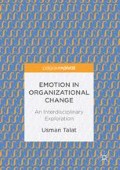Abstract
Western thought on emotion owes considerable debt to the ideas of early Greek thinkers. Both explicitly and implicitly, ancestral Greek thought has influenced our everyday sense of emotion and shaped our scientific knowledge of this peculiar concept in several fields including biology, sociology, psychology and economics. By comparison, the relatively new field of organizational change has not yet explored the influence of early Greek thought, specifically with regard to emotions. Addressing this prospect, this chapter explores the journey of philosophers in search of what emotion is and how it manifests behaviour. To develop the relevant focus, philosophical narrations are expounded in places that draw on modern organizational change situations faced by employees.
Access this chapter
Tax calculation will be finalised at checkout
Purchases are for personal use only
References
Aristotle. (2001). The basic works of Aristotle. R. Mckeon (Ed). New York: Modern Library Classics.
Balot, R. K. (2001). Greed and injustice in classical Athens. Princeton, NJ: Princeton University Press.
Barnes, J. (1982). The presocratic philosophers, revised ed. London: Routledge & Kegan Paul.
Buss, D. M. (1995). Evolutionary psychology: A new paradigm for psychological science. Psychological inquiry, 6(1), 1–30.
Damasio, A. (2003). Looking for Spinoza. Joy, Sorrow and the Feeling Brain. San Diego, California: Harvest Book.
Deonna, J., Tappolet, C., & Teroni, F. (2015). Emotion, philosophical issues about. Wiley Interdisciplinary Reviews: Cognitive Science, 6(3), 193–207.
Ekman, P. (1972). Universals and cultural differences in facial expressions of emotion. In J. Cole (Ed.), Nebraska symposium on motivation (pp. 207–283). Lincoln: University of Nebraska Press.
Ekman, P. (1990). Duchenne and facial expression of emotion. In R. A. Cuthbertson (Ed. and Transl.), The Mechanism of Human Facial Expression (pp. 270-284). Cambridge: Cambridge University Press.
Ekman, P. (1992). An argument for basic emotions. Cognition & Emotion, 6(3–4), 169–200.
Eknoyan, G. (1988). Origins of nephrology: Hippocrates, the father of clinical nephrology. American Journal of Nephrology, 8(6), 498–507.
Fineman, S. (1993). Organizations as emotional arenas. In S. Fineman (Ed.), Emotion in organizations (pp. 9–35). London: Sage Publications.
Frede, M. (1974). Stoic vs. Aristotelian syllogistic. Archiv für Geschichte der Philosophie, 56(1), 1–32.
Frijda, N. H. (1986). The emotions: Studies in emotion and social interaction. London: Cambridge University Press.
Gabriel, A. S., Cheshin, A., Moran, C. M., & van Kleef, G. A. (2016). Enhancing emotional performance and customer service through human resources practices: A systems perspective. Human Resource Management Review, 26(1), 14–24.
Gerth, H. H., & Mills, C. W. (1958). From max weber: Essays in. Sociology, 110.
Goldie, P. (2002). Emotions, feelings and intentionality. Phenomenology and the Cognitive Sciences, 1(3), 235–254.
Goldie, P. (2005). Imagination and the distorting power of emotion. Journal of Consciousness Studies, 12(8–9), 127–139.
Grammaticos, P. C., & Diamantis, A. (2008). Useful known and unknown views of the father of modern medicine, Hippocrates and his teacher Democritus. Hellenic Journal of Nuclear Medicine, 11(1), 2–4.
Hartnack, J. (1974). Immanuel Kant: An explanation of his theory of knowledge and moral philosophy. Atlantic Highlands, NJ: Humanities Press.
Hess, U., & Thibault, P. (2009). Darwin and emotion expression. American Psychologist, 64(2), 120.
Irwin, T. (2000). Nicomachean ethics. Indianapolis: Hackett Publishing.
Kenny, A. (2012). A new history of Western philosophy. Oxford: Oxford University Press.
Leighton, S. R. (1996). Aristotle and the emotions. In A. O. Rorty (Ed.), Aristotle’s Rhetoric (pp. 206–237). Berkeley, CA: University of California Press.
Lennox, J. G. (1991). Between data and demonstration: The analytics and the historia animalium.
Louden, R. B. (2011). Kant’s human being. Essays on his Theory of Human Nature. New York: Oxford University Press.
Magala, S. (2009). The management of meaning in organizations. Basingstoke: Palgrave Macmillan.
Poster, C. (1996). Being and becoming: Rhetorical ontology in early Greek thought. Philosophy & Rhetoric, 29(1), 1–14.
Power, M., & Dalgleish, T. (2015). Cognition and emotion: From order to disorder. Hove, England: Psychology Press.
Reevy, G. M. (2010). Encyclopedia of emotion. ABC-CLIO.
Reichenbach, H., & Reichenbach, M. (1991). The direction of time, 65. Berkley, LA: University of California Press.
Robjant, D. (2014). Nauseating Flux: Iris Murdoch on Sartre and Heraclitus. European Journal of Philosophy, 22(4), 633–652.
Russell, B. (2007). History of western philosophy. London: Routledge Taylor & Francis Group.
Scott, W. R., & Davis, G. F. (2015). Organizations and organizing: Rational, natural and open systems perspectives. London: Routledge.
Sherman, N. (2014). The place of emotions in Kantian morality. In A. Cohen (Ed.), Kant on Emotion and Value (pp. 11–32). UK: Palgrave Macmillan.
Solomon, R. C. (1989). The emotions of justice. Social Justice Research, 3(4), 345–374.
Solomon, R. C. (2002). Back to basics: On the very idea of “basic emotions”. Journal for the Theory of Social Behaviour, 32(2), 115–144.
Solomon, R. C. (2004). Aristotle, ethics and business organizations. Organization Studies, 25(6), 1021–1043.
Suchy, Y. (2011). Clinical neuropsychology of emotion. Guilford Press.
Tyrer, P., Coombs, N., Ibrahimi, F., Mathilakath, A., Bajaj, P., Ranger, M., … & Din, R. (2007). Critical developments in the assessment of personality disorder. The British Journal of Psychiatry, 190(49), s51–s59.
Wittkower, E. (1935). Studies on the influence of emotions on the functions of the organs. The British Journal of Psychiatry, 81(334), 533–682.
Author information
Authors and Affiliations
Rights and permissions
Copyright information
© 2017 The Author(s)
About this chapter
Cite this chapter
Talat, U. (2017). Early Greek Thought and the Philosophers of the Enlightenment Era. In: Emotion in Organizational Change. Palgrave Macmillan, Cham. https://doi.org/10.1007/978-3-319-47693-3_1
Download citation
DOI: https://doi.org/10.1007/978-3-319-47693-3_1
Published:
Publisher Name: Palgrave Macmillan, Cham
Print ISBN: 978-3-319-47692-6
Online ISBN: 978-3-319-47693-3
eBook Packages: Business and ManagementBusiness and Management (R0)

